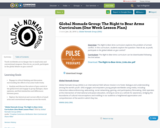
Youth worldwide are in danger due to small arms and conventional weapons. How do we, as youth, participate in the global debate on gun control?
- Subject:
- Arts and Humanities
- Social Science
- Material Type:
- Lesson Plan
- Date Added:
- 04/04/2014

Youth worldwide are in danger due to small arms and conventional weapons. How do we, as youth, participate in the global debate on gun control?

Image source: "Writing" by Ramdlon at https://pixabay.com/en/writer-writing-paper-letter-author-605764/Unit Overview: The Writers on Writing Unit engages students in reading, analyzing, and creating literacy narratives, or stories about learning to read and write. The unit begins by asking students to view and read literacy narratives, and to analyze author’s literacy narratives through annotation, discussion, and writing a formal analysis essay. As students go through the narratives, they are asked to analyze author technique and purpose, paying close attention to style, syntax, and organization in preparation for writing their own authentic literacy narratives and ultimately creating digital storytelling projects about those narratives. By the end of this unit, students will have composed analysis writing, creative nonfiction, and multimedia stories. They will have had the ability to select certain reading assignments, to work in groups and with partners to brainstorm, edit, and revise, and they will have had guided writing lessons on composing strong sentences.

Unit Overview: The Writers on Writing Unit engages students in reading, analyzing, and creating literacy narratives, or stories about learning to read and write. The unit begins by asking students to view and read literacy narratives, and to analyze author’s literacy narratives through annotation, discussion, and writing a formal analysis essay. As students go through the narratives, they are asked to analyze author technique and purpose, paying close attention to style, syntax, and organization in preparation for writing their own authentic literacy narratives and ultimately creating digital storytelling projects about those narratives. By the end of this unit, students will have composed analysis writing, creative nonfiction, and multimedia stories. They will have had the ability to select certain reading assignments, to work in groups and with partners to brainstorm, edit, and revise, and they will have had guided writing lessons on composing strong sentences. Days 3 to 5 Overview: These plans are for Days 3 to 5 of the Writers on Writing Unit. On day 3, students listen to podcasts about different perspectives on struggling to read. They then complete a pre-assessment, reading and analyzing a literacy narrative with guided style analysis notes. Students will then review the pre-assessment activity in preparation for reading their own selections of professional literacy narratives on day 2. The lesson will culminate with students writing an analysis of a professional literacy narrative. Image source: "Idea" from Pxhere.com
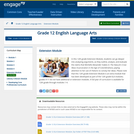
In this 12th grade Extension Module, students can go deeper into analyzing arguments, as they outline, analyze, and evaluate the claims that Michelle Alexander makes in|The New Jim Crow: Mass Incarceration in the Age of Colorblindness, paying attention to her use of rhetoric to convey her ideas. Please note that this 12th grade Extension Module is an extra module that has been developed as part of the 12th grade ELA modules; grades 9-11 do not have additional or extension modules. A full year of curriculum is available for 12th grade through modules 1-4.
Find the rest of the EngageNY ELA resources at https://archive.org/details/engageny-ela-archive .
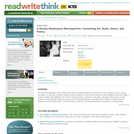
Students research, evaluate, and synthesize information about the Harlem Renaissance from varied resources, create an exhibit, and highlight connections across disciplines (i.e., art, music, and poetry) using a Venn diagram.
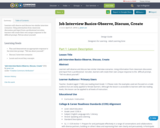
Learners will observe and discuss two similar interview scenarios. Using information from classroom discussion and input from a professional recruiter, learners will create their own unique response to the difficult prompt, Tell me about yourself.

This activity asks students to think about prejudices before they begin to read The Laramie Project.
![Lenses of Vietnam: Protest in a Democracy [Inquiry Design Model (IDM) Unit Plan]](https://img.oercommons.org/160x134/oercommons/media/courseware/lesson/image/22Photograph_of_a_Female_Demonstrator_Offering_a_Flower_to_a_Military_Police_Officer22_by_Albert_R._Simpson_uOQkEc8.gif)
This inquiry takes students through an analysis and evaluation of the Compelling Question “Is protest important in a democracy?” using the Vietnam War as a lens to approach the topic. To accomplish this, students will become more media literate through evaluating sources, biases, perspectives, and the goals of creating media. Throughout the inquiry, students will engage in activities designed to promote and develop media literacy while analzying the Compelling Question and learning about the historical protests of the Vietnam Era.This inquiry is expected to take two weeks (10 periods) to complete: one 45-minute class period to stage the question, introduce the inquiry, and to review media literacy; two 45-minute class periods for each of the three supporting questions; and then three 45-minute class periods for students to write and research their argumentative thesis. If students are as of yet less familiar with media literacy, the instructor should add at least another class period, or more, introducing them more fully to this.The full unit, along with all materials and resources, is available as a PDF attachment.

Natural High is a non-profit organization that focuses on the power of storytelling to transform lives. They engage storytellers who kids admire and trust and work with these influencers to create free and impactful content for educators and parents.The activities are designed to develop student understanding about the consequences of drug and alcohol abuse and also to support students in learning and practicing strategies to make healthy decisions. The evidence-based program is used in all 50 states and makes use of current scientific findings on youth behavior, brain development, social norming, and substance abuse prevention.This resource highlights activities in the Understanding the Consequences of Drugs and Alcohol area of focus. Visit the Natural High website at https://www.naturalhigh.org/ for additional materials.

Food waste is a major contributor to greenhouse gas. Wasted food and the resources to produce that food are responsible for approximately 8% of global greenhouse gas emissions. In this storyline, students learn about the resources required to produce food through following the carbon cycle and discover how food waste contributes to climate change. They will also learn the farm to table transport chain as well as how to conduct a food waste assessment. Finally, the students will research solutions to the problem of food waste and, as a final project, present one solution that they have thoroughly researched that can be applicable to their community. For CTE teachers, this storyline provides the basic knowledge needed to develop a deep understanding of WHY reducing food waste is an important solution to climate change. There are several potential extensions that Family Consumer Science teachers can utilize as well as Ag teachers and even Business teachers. There is a partial list at the end of the learning progressions.

Students will be learning about the practices of regenerative agriculture and how regenerative agriculture is a solution to climate change. Embedded in the storyline are scientific concepts relating to carbon cycling and soil microbial activity. The storyline culminates with students creating an infographic that is intended for educating the community about regenerative agricultural practices.

As the climate is changing, one of the many consequences is sea level rise, which is not a standalone factor, but is closely related to erosion and extreme weather/storm conditions. The majority of coastal houses, recreational parks, and other coastal buildings were built as sturdy but stagnant structures that do not adjust well to the changing elements. Coastal homes have been collapsing into the ocean and restaurants have been destroyed by storm waves. The economic damage has been accumulating. In this storyline, students will explore the reasons behind sea level rise looking at thermal expansion, glacial ice melt, and sea ice melt. Students will examine real scenarios of coastal damage in Washington state and evaluate current city and tribal resilience plans. Finally, students will evaluate the constraints of existing challenges and propose strategies for solving these challenges.
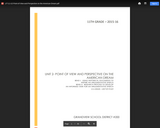
In the first bend of this unit, students will closely read multiple perspectives on the “American Dream” in
order to collect information to use and integrate that information into an evidence-based perspective.
Students will examine primary and secondary source documents to make informed decisions about
what information to collect that may inspire their writing about “The American Dream.”
In the second bend of this unit, students will engage in a short-research process to create a draft of
argumentative speech on the “American Dream” with a specific purpose, audience, and tone in mind.
They will use their inquiry research questions from bend one to begin analyzing search results and citing
and gathering relevant, accurate, and credible information.
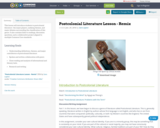
This lesson will introduce students to postcolonial literature--the major players, unifying themes, and major debates surrounding the classification of this genre. It also contains links to readings, discussion questions, and a collaborative project aligned to multiple Common Core standards.
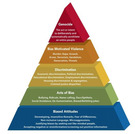
This lesson from the Holocaust Center for Humanity provides an opportunity to define and recognize hatred in all of its forms and how hate and prejudice can escalate when no one speaks up or takes action. The resource incorporates the Pyramid of Hate, created by the Anti-Defamation League (ADL), Echoes and Reflections, and further adapted by the Holocaust Center for Humanity.
The content included in the Holocaust Center for Humanity website is intended for educational purposes only and is free for viewing online.

This media literacy unit was designed and piloted with junior English classes at the start of the school year. Activities can easily be adapted to suit secondary students at various levels. Within the unit, students analyze corporate logos, corporate advertising, movie trailers and stereotypes found in media related to Native American culture. Within the unit, students also learn how to consider the ways in which media appeals to ethos, pathose and logos and how to identify the tone of a piece of media.
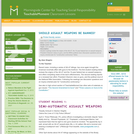
Student readings review the origins of the AK-47, the 10-year federal ban on assault weapons, President Obama's views on guns, and the NRA's political clout. Discussion questions and an inquiry-oriented plan for "constructive controversy" follow.

This light activity deals with "silent letters" of English language which are encountered in a large number of English language words. Students read a fairly simple dialogue with the blanks for words containing silent letters. Silent letters, however, are listed while the rest of the letters are blanked. Students find the missing words and become aware of silent letters. Great activity for a warm-up.

While reading The Narrative of the Life of Frederick Douglass, An American Slave, it is necessary to discusss the methods used to control slaves. The presentation provides students with related publications, evidence from the narrative, and discusses the effects of dehumanization. The activity linked in the presentation asks students to mirror the use of animal imagery found in both Douglass' narrative and Spiegelman's graphic novel series "Mauss."
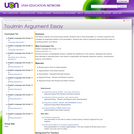
This lesson extends over several class periods. Students view a Prezi presentation on Toulmin's argument and complete an assignment based on the presentation. Students then write an argument essay about the power of prevailing passion over reason.